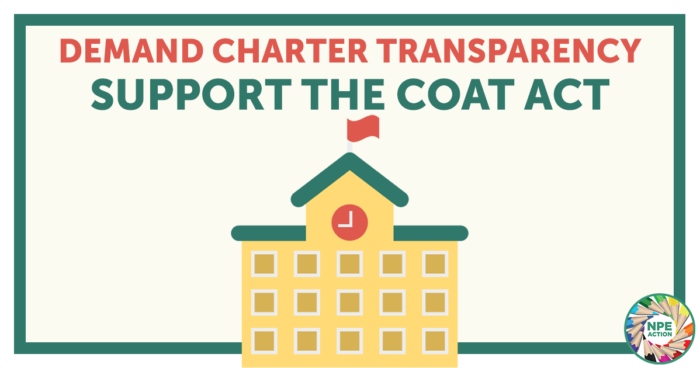There’s now federal legislation (COAT Act) that would foster transparency among charter schools. Here’s more on what that means from the Network for Public Education.
In February of 2017, Betsy DeVos was sworn in as the U.S. Secretary of Education after 20 years of pushing for charter school expansion in her home state of Michigan – which now leads the nation in the number of schools operated for-profit, has more low-performance charter schools than any other state, and lacks any mechanism for oversight of failing charters. Michigan’s experiment with charters has led to a system of poor schools run by for-profit companies failing thousands of students, and millions of dollars lost to fraud and waste.
Over those same 20 years, the Department of Education gave more than $4 billion to states to increase the number of charter schools without requiring strong oversight systems. As a result, it is estimated that over $1 billion of taxpayer money has been lost to charter school waste, fraud, and abuse. Without the necessary oversight for charter schools, our children will continue to suffer while taxpayers will be caught holding the bill for charter school waste and abuse.
That’s why three years after Betsy DeVos’ confirmation as Secretary of Education, Rep. Tlaib is introducing the Charter Oversight, Accountability, and Transparency (COAT) Act.
Charter schools are publicly funded but are managed privately by Private Charter Management Organization (PCMOs). The PCMOs essentially act as the school district, running the daily operations, employing teachers, and freely deviating from most state guidelines, including testing and curriculum.
Under this legislation, States are ineligible for federal Elementary and Secondary Education Act funds unless their school districts’ contracts with PCMOs include basic transparency requirements. These transparency measures will require PCMOs to disclose to the Department of Education:
- The dollar amount and percentage breakdown of money being used by the PCMO on the operations of the school.
- The dollar amounts and percentage breakdown of money being used on the operations of the PCMO.
- The dollar amounts every executive is earning in salary from the PCMO.
- The identity of any company or organization the PCMO has financial interest in.
- Whether the PCMO is for-profit or non-profit.
In addition, school districts contracting with PCMOs will require the PCMOs to:
- Hold board meetings that are publicly disclosed and accessible to the public.
- Annually disclose the members of the board of directors.
Since charter schools are privately-run but funded by our tax dollars, it is imperative that they are subject to basic transparency measures. The COAT Act is commonsense legislation that will increase transparency and accountability to ensure that charter schools provide necessary information to local, state, and federal agencies to detect and prevent fraud. Our children deserve better.
To urge your Tennessee Member of Congress to support the COAT Act, click here.

For more on education politics and policy in Tennessee, follow @TNEdReport
Your support — $5 or more today — makes publishing education news possible.
